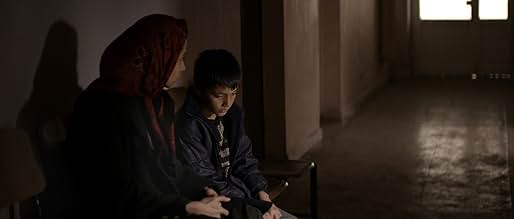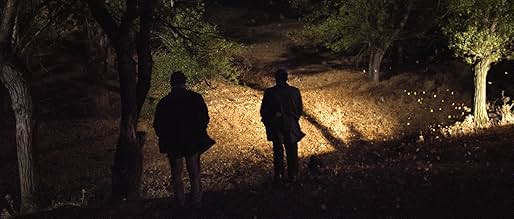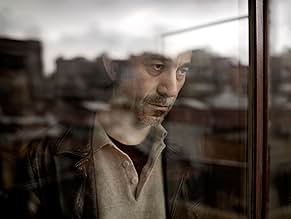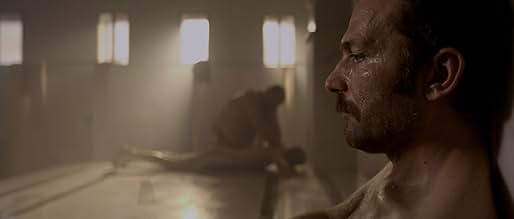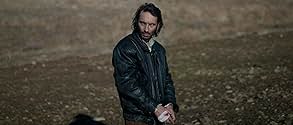NOTE IMDb
7,8/10
52 k
MA NOTE
Un groupe d'hommes part à la recherche d'un cadavre dans les steppes anatoliennes.Un groupe d'hommes part à la recherche d'un cadavre dans les steppes anatoliennes.Un groupe d'hommes part à la recherche d'un cadavre dans les steppes anatoliennes.
- Réalisation
- Scénario
- Casting principal
- Récompenses
- 21 victoires et 34 nominations au total
Avis à la une
10calorne
This is a terrific film. The cinematography is brilliant, fabulous. The acting is excellent. The dialogue is very natural, sometimes very funny (as in the subtitle quote in the heading of this review) sometimes philosophical, but always drawing us into the story and the lives of the characters.
There is a mystery within a mystery., one I understood in the end, the other I am not so sure about - but being left in doubt did not leave me disappointed but rather it left me liking the film even more.
This is an incredibly rich viewing experience even though it depicts relatively impoverished living standards.
It can hardly be called action packed but it is extremely engaging because of how beautifully it is filmed and how well it is written.
There is a mystery within a mystery., one I understood in the end, the other I am not so sure about - but being left in doubt did not leave me disappointed but rather it left me liking the film even more.
This is an incredibly rich viewing experience even though it depicts relatively impoverished living standards.
It can hardly be called action packed but it is extremely engaging because of how beautifully it is filmed and how well it is written.
A dark cold night over the Turkish steppes, an entourage of police detectives, a commissioner, a doctor, and two grim prisoners in tow search for a dead body for over 2 hours in the darkest part of the night. What appears to be a good setup for the latest police procedural, crime fiction, thriller, even midnight horror turns out unexpected intensely revealing character portraits, in a most exhaustive and surprisingly humorous way. Recreating his earlier slow burn meditations, yet with a new sense of maturity "Anatolia" is true to the real rhythms of night, the frustrations of waiting for the crucial evidence to appear, the vagueness of memory, remembrance of traumatic events in love and in murder and the bleakness of night of the eternal night and unwelcome truths revealed by the day.
One senses the tedium and frustration of the murder investigation, simultaneously the dread and anticipation of revealing the dead body in it's gory realism, the salacious details resulting in the murder itself and the public crucification of the culprits Anatolia however is almost an antithesis to the psychological revelations over the course of the night.
Before (and if) we reach the major discovery, the police officers and commissar reveal their aversions to murder, mortality, the search for a guilty suspect before the evidence is revealed, their cultural differences, assumptions about class differences, marriage, and human nature. Throughout the eternal stillness of night, poetic treatises about life, death and love are superimposed over cracks of thunder, howling winds and pattering rains, the harsh spotlight of car headlamps contrast with the comforting glow of a flickering lantern on a village porch.
The search is tedious and frustrating for both the officers and the audience, as much as the motives are unclear, like love, life, and marriage. The ambiguity of night is as unclear as the motives for murder, does daybreak reveal anything revelatory, and does the dissection of a murder case hours and days after its uncovering reveal any truth into it's motives or human nature itself?
The audience should be wiser against the small town working-class police task-force just following orders; they may empathise more with the reflective and sensitive Doctor Cemal or the cunning and charismatic Prosecutor Nusret, yet under the surface, their own personal lives in marriage and children are vexed, the investigation is almost a respite from these frustrations. The commissioner seems haunted by his ill wife, yet on the surface, this is treated as a running joke, later, it reveals thematic links to the search for answers in the unknown murder case. Similarly the doctor tries to make peace with his conscience about a past personal relationship. The impression of him is the most sensible, grounding the moral compass, yet his flaws are also revealed by daylight.
Contrasts between these characters and the murder suspect who appears (at least on the surface) to be more emotionally stable than many of the prosecutors is complex and kaleidoscopic. This is a remarkable introspective film ostensibly exploring a murder case and therefore guilt and conscience, yet further introspection reveals riffs on love story(ies), female roles, family, honour, class prejudice and the legal system.
Women appear seldom in the film, some wives are talked about yet, their effect on the men (and audience) is haunting, magnetic, and enigmatic. The small towns which they stop at along their road trip are barren, simple, country-like, impressing the sense of isolation both physically and more saliently, emotionally. The appearance of women and children in these towns is revelatory and thirst-quenching. Therefore a lot of time spent for introspection and meditation, watching how the characters reacting to the tedium, stress, fatigue and mortality of a long hard night.
The terrain of Anatolia is a foreboding character in itself with it's rolling fields illuminated by the sharp piercing car headlights slicing the night like snippets revealed about each character - yet the whole picture remains hidden. A storm is sensed coming both literally and figuratively, the expectant howling winds like ghosts of the dead and the memories of the characters across the unforeseeable terrain. The mood is incredibly poetic, rhythmically blending with the sounds of the whistling winds, the crunch of icy gravel, pattering of rain, and fluttering pigeons, all in the emptiness of night.
Nuri Bilge Ceylan's previous films have been sombre (frustrations) meditations on human nature, such as the brewing storm in 3 Monkeys, the solitude of cascading snow and the cracking waves of the harbour in Distant, to the scorching blistering summer in Climates; environment and mood work in integration in his work. In "Anatolia", the moods over the windy plains are as intense as the brewing moods in the characters.
The scenes of the cars rolling across the plains lit only by the headlights occupy the initial part of the film. They run almost in real time; with the wind whipping though grass and plains they form a stark, haunting and grim atmosphere. There are bravura haunting scenes like the rolling apple down the hill, whilst initially seemingly superfluous, yet curious it's implications to reveal characters' current moods and eventual outcomes. And the the colloquial dinner at the mayor house under the swaying candlelight, then in pitch darkness, the light revealing (literally) different shades of each character; they the revelation (apparition) of a miraculous figure moments later is spellbinding.
This is cinema with the highest respect for the audience, yet Ceylan has said that he wants to bore the audience, "because out of boredom might come a miracle - maybe days later, maybe years." Not sure whether to take this seriously however what it does demonstrate is a greater onus on viewer to think actively about the story and the consequences; out of deep reflection perhaps may come a revelation about the characters and ourselves.
One senses the tedium and frustration of the murder investigation, simultaneously the dread and anticipation of revealing the dead body in it's gory realism, the salacious details resulting in the murder itself and the public crucification of the culprits Anatolia however is almost an antithesis to the psychological revelations over the course of the night.
Before (and if) we reach the major discovery, the police officers and commissar reveal their aversions to murder, mortality, the search for a guilty suspect before the evidence is revealed, their cultural differences, assumptions about class differences, marriage, and human nature. Throughout the eternal stillness of night, poetic treatises about life, death and love are superimposed over cracks of thunder, howling winds and pattering rains, the harsh spotlight of car headlamps contrast with the comforting glow of a flickering lantern on a village porch.
The search is tedious and frustrating for both the officers and the audience, as much as the motives are unclear, like love, life, and marriage. The ambiguity of night is as unclear as the motives for murder, does daybreak reveal anything revelatory, and does the dissection of a murder case hours and days after its uncovering reveal any truth into it's motives or human nature itself?
The audience should be wiser against the small town working-class police task-force just following orders; they may empathise more with the reflective and sensitive Doctor Cemal or the cunning and charismatic Prosecutor Nusret, yet under the surface, their own personal lives in marriage and children are vexed, the investigation is almost a respite from these frustrations. The commissioner seems haunted by his ill wife, yet on the surface, this is treated as a running joke, later, it reveals thematic links to the search for answers in the unknown murder case. Similarly the doctor tries to make peace with his conscience about a past personal relationship. The impression of him is the most sensible, grounding the moral compass, yet his flaws are also revealed by daylight.
Contrasts between these characters and the murder suspect who appears (at least on the surface) to be more emotionally stable than many of the prosecutors is complex and kaleidoscopic. This is a remarkable introspective film ostensibly exploring a murder case and therefore guilt and conscience, yet further introspection reveals riffs on love story(ies), female roles, family, honour, class prejudice and the legal system.
Women appear seldom in the film, some wives are talked about yet, their effect on the men (and audience) is haunting, magnetic, and enigmatic. The small towns which they stop at along their road trip are barren, simple, country-like, impressing the sense of isolation both physically and more saliently, emotionally. The appearance of women and children in these towns is revelatory and thirst-quenching. Therefore a lot of time spent for introspection and meditation, watching how the characters reacting to the tedium, stress, fatigue and mortality of a long hard night.
The terrain of Anatolia is a foreboding character in itself with it's rolling fields illuminated by the sharp piercing car headlights slicing the night like snippets revealed about each character - yet the whole picture remains hidden. A storm is sensed coming both literally and figuratively, the expectant howling winds like ghosts of the dead and the memories of the characters across the unforeseeable terrain. The mood is incredibly poetic, rhythmically blending with the sounds of the whistling winds, the crunch of icy gravel, pattering of rain, and fluttering pigeons, all in the emptiness of night.
Nuri Bilge Ceylan's previous films have been sombre (frustrations) meditations on human nature, such as the brewing storm in 3 Monkeys, the solitude of cascading snow and the cracking waves of the harbour in Distant, to the scorching blistering summer in Climates; environment and mood work in integration in his work. In "Anatolia", the moods over the windy plains are as intense as the brewing moods in the characters.
The scenes of the cars rolling across the plains lit only by the headlights occupy the initial part of the film. They run almost in real time; with the wind whipping though grass and plains they form a stark, haunting and grim atmosphere. There are bravura haunting scenes like the rolling apple down the hill, whilst initially seemingly superfluous, yet curious it's implications to reveal characters' current moods and eventual outcomes. And the the colloquial dinner at the mayor house under the swaying candlelight, then in pitch darkness, the light revealing (literally) different shades of each character; they the revelation (apparition) of a miraculous figure moments later is spellbinding.
This is cinema with the highest respect for the audience, yet Ceylan has said that he wants to bore the audience, "because out of boredom might come a miracle - maybe days later, maybe years." Not sure whether to take this seriously however what it does demonstrate is a greater onus on viewer to think actively about the story and the consequences; out of deep reflection perhaps may come a revelation about the characters and ourselves.
Anatolia, simply the rest of Turkey other than Istanbul. It is a place where the hospitality is served as the only gift with respect and honor. The fascinating thing is to see such sort of story which takes place in this land of world where hundreds of nations have existed and vanished throughout the history, by a magnificent director, Nuri Bilge Ceylan. I can understand people who have harsh criticism about these kind of arts so called as ''film-noir''. It may seem too slow or simply lack of action or someone can even question how other people can enjoy by watching so called cliché ' a man looking beyond the horizons all along the movie'. The point is no body has to like this sort of art. For instance it is like reading a book. Consider some pages of a book when there is no action but the author speaks instead of the hero of the book. So by watching ' a man looking beyond the horizons' makes me question what he could think or makes me put myself in the middle of the situation. And I really feel like I am that guy in the movie. But I really really and really feel like I am that guy, when the movie is so perfectly directed and so perfectly portrayed.
We can call this movie as a bridge or as a milestone in Ceylan's career. It is as simple as that, there is a very obvious change in Ceylan's directing and writing after seeing that movie. Having seen that, we can make this comparison like Before or After Once upon a Time in Anatolia. It is not 'three monkeys' or 'the climates' or 'the distant', it is obviously another one that carries Nuri Bilge Ceylan's way of directing to the next level.
Another must see...
We can call this movie as a bridge or as a milestone in Ceylan's career. It is as simple as that, there is a very obvious change in Ceylan's directing and writing after seeing that movie. Having seen that, we can make this comparison like Before or After Once upon a Time in Anatolia. It is not 'three monkeys' or 'the climates' or 'the distant', it is obviously another one that carries Nuri Bilge Ceylan's way of directing to the next level.
Another must see...
I watched "Bir Zamanlar Anadolu'da" just a couple of hours ago and wanted to write a review immediately before the satisfaction it provides fades away. In one word, it's a marvellous film which should not be missed!
The scenery and the images are fantastic. The journey motif makes it the lives that cross one another familiar. And the acting! It totally blew my mind! It seems as if the director is really relating the story of a group of people without ever making his presence felt. It does not feel like you are watching a film at all but from the very first moment you are taken in by the film.
I want to congratulate Nuri Bilge Ceylan and all those contributors in this manner. This was his first film I've ever watched and I'll watch the rest at once without any delay. I already feel like I've lost a lot of my precious time...
Thanks a lot for this cinematographic marvel, people like you make us realise that cinema is in truth an art; one which keeps mesmerising us all...
The scenery and the images are fantastic. The journey motif makes it the lives that cross one another familiar. And the acting! It totally blew my mind! It seems as if the director is really relating the story of a group of people without ever making his presence felt. It does not feel like you are watching a film at all but from the very first moment you are taken in by the film.
I want to congratulate Nuri Bilge Ceylan and all those contributors in this manner. This was his first film I've ever watched and I'll watch the rest at once without any delay. I already feel like I've lost a lot of my precious time...
Thanks a lot for this cinematographic marvel, people like you make us realise that cinema is in truth an art; one which keeps mesmerising us all...
I think this is the best movie of 2011 so far. A very different, but brilliantly conceived three part police procedural that is really a character study of two men and how they each deal with the past. In many ways, I had a similar experience here to what I have when I read a really good novel. The characters are rich and complex, often funny, and thoroughly believable. Nothing is crammed down the audience's throat, yet there is so much detail and nuance that it becomes easy to see the two men for the basically good, complex people they are. This is a movie that respects the audience's intelligence. It is also a movie that is easily among the best shot and edited of the year. In fact, it is hard to think of a single thing that I would suggest to improve the film. I have seen other Ceylan films, but nothing of his has ever had the depth, nuance and humanity of this one.
Le saviez-vous
- AnecdotesThe anecdote about the sudden death of a woman told by prosecutor Nusret and the doctor's deduction come from the short story The Examining Magistrate by Russian writer Anton Chekhov.
- GaffesNaci speaks to his wife on the mobile phone. When his wife hangs up angrily, a dial tone is heard. No dial tone is heard on mobile phones.
- Citations
Prosecutor Nusret: Ignore Naci. He's just a handful of bees, as my mother would say. All noise and no action.
- ConnexionsFeatured in The 2013 Film Independent Spirit Awards (2013)
Meilleurs choix
Connectez-vous pour évaluer et suivre la liste de favoris afin de recevoir des recommandations personnalisées
- How long is Once Upon a Time in Anatolia?Alimenté par Alexa
Détails
- Date de sortie
- Pays d’origine
- Sites officiels
- Langue
- Aussi connu sous le nom de
- Once Upon a Time in Anatolia
- Lieux de tournage
- Sociétés de production
- Voir plus de crédits d'entreprise sur IMDbPro
Box-office
- Montant brut aux États-Unis et au Canada
- 152 408 $US
- Week-end de sortie aux États-Unis et au Canada
- 10 952 $US
- 8 janv. 2012
- Montant brut mondial
- 2 099 472 $US
- Durée2 heures 37 minutes
- Couleur
- Mixage
- Rapport de forme
- 2.39 : 1
Contribuer à cette page
Suggérer une modification ou ajouter du contenu manquant

Lacune principale
By what name was Il était une fois en Anatolie (2011) officially released in India in Hindi?
Répondre

